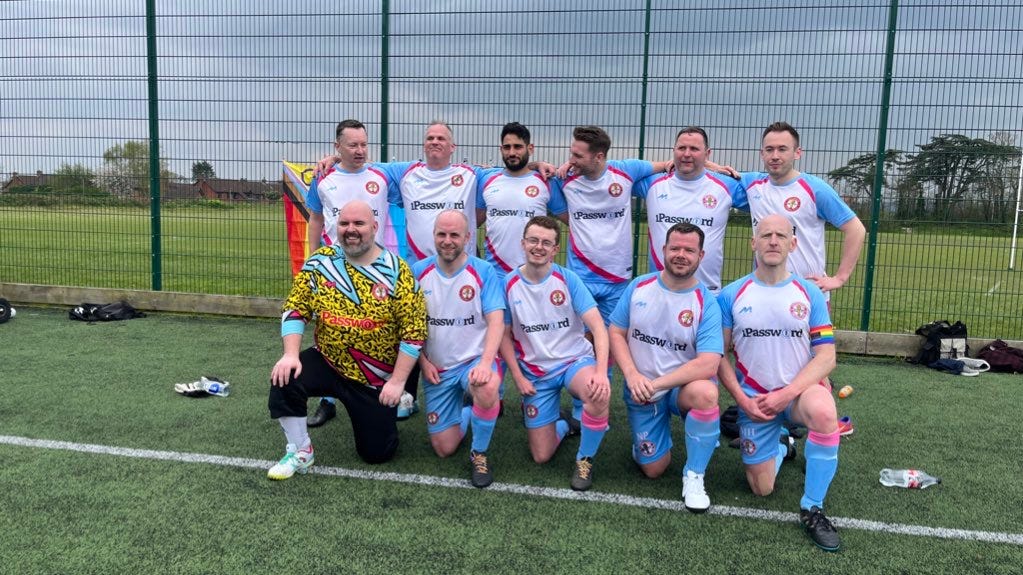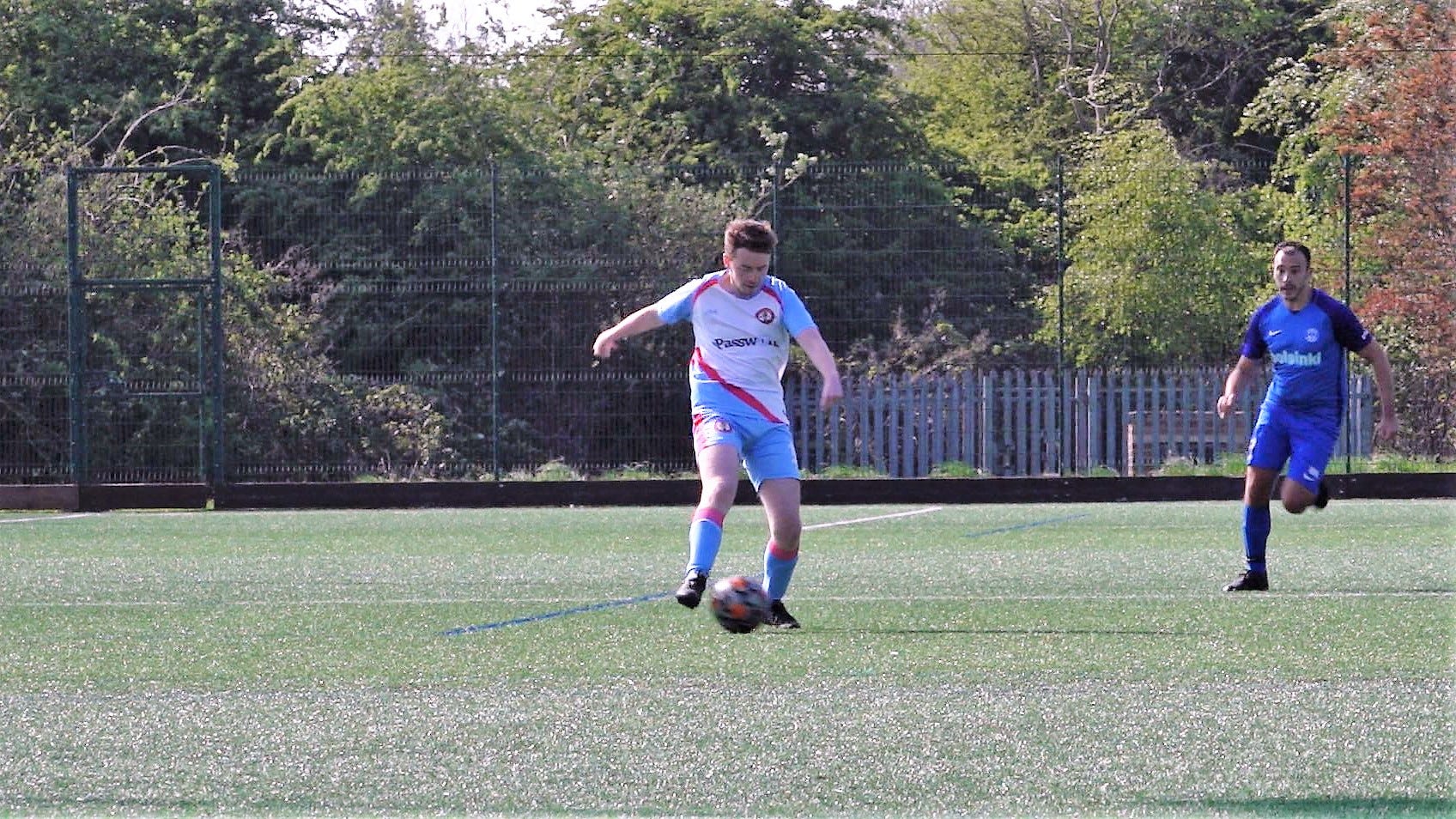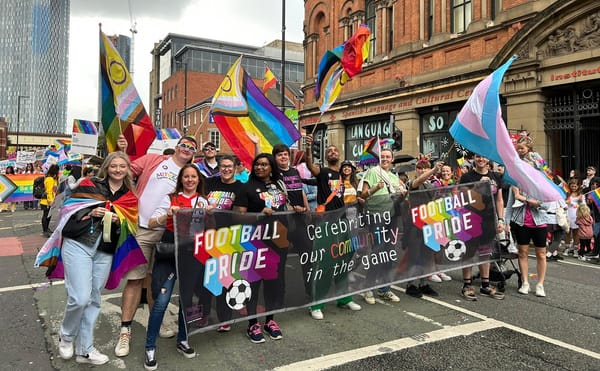Playing football made me comfortable in my masculinity as a trans man. But don't expect me to be any good at it.
For Arthur, finding the right team meant he could stop placing such high expectations on himself and learn to embrace the joy of playing football, no matter how mediocre his skillset.
By Arthur Webber
Football made me comfortable in my masculinity. Given the kind of masculinity often associated with the sport – the loud, aggressive, would spit at you in the street if you supported the other team on local derby day type – this may seem like an odd statement. However, as a trans man, coming home to the beautiful game was the best thing I ever did for beating off insecurities about my identity.
There’s a lot of debate about trans people in sports at the moment. About trans people in general, really. I mentioned in this article for Huck that I’d internalised transphobic arguments that I would never be good enough to compete with other men at sport, simply because of my sex assigned at birth. I’d actually absorbed transphobia about my entire being, from how I dressed to what music I listened to, which I suppose comes with being on Twitter. Transphobia is hard to avoid there. Towards others, I’ve always been a “you can be anything you want to be” guy, but internally applied restrictions to myself.
That article back in April 2022 was published one month into my first season at Leftfooters FC, right at the beginning of the newest chapter in my love story with football. So I’d like to explore how I’ve grown and changed since. As a man, more than as a player, because my ability in that regard is still nothing to shout from the rooftops about.
Subscribers get pieces like this in their inboxes before anyone else sees them. It’s free to subscribe and we don’t send spam.
Early on, I had believed, as others had repeatedly informed me online, that I was an outsider invading a space for gay men. A trans (and thus, “not real”) man in a sporting environment dominated by cis (and thus, “real”) men. Therefore, I needed to prove that I was worth keeping around, worth the irritation of changing how they spoke, and worth the potential conflicts they may have with other teams due to my inclusion. I imagine many cis queer men have felt this too in non-LGBTQ+ specific leagues.

For a long time, I had felt that to be valid in my masculine identity I had to exceed all expectations of my sporting prowess. I must become a one-man defensive machine and individually ensure we keep clean sheets every game. I needed to tally up a record number of assists. Maybe score a goal if we were pressing high enough. Whenever we’d lose, I’d wonder “if only I’d started testosterone a year earlier, I could have been fast enough to block that cross” or “if I was cis, I’d have been tall enough to win that header”. In my head, I’d be comparing myself to other members of my team in each match, attempting to calculate if I was the worst performing and if others on the pitch would make a connection between my transness and a subpar game.
Leftfooters FC’s ethos is the direct opposite of these thoughts. They provide an inclusive space for every LGBTQ+ person who wants to have a go at football, regardless of age or ability. I knew this. It was one of the reasons I signed up – that, and Wednesday night 6-a-side is one stop on the tube from my flat. But I still worried all the same. 0/10, would not recommend gender dysphoria to a friend.
As I continued to play across the last two seasons, I eventually realised that none of my teammates view me as “the trans one” who they keep around for the diversity quota. I’m nobody’s scapegoat for a devastating defeat. I’m just their friend Arthur, who occasionally fouls an opposing winger uncomfortably close to the box. Their friend Arthur who they frequently forget is trans, and have upon occasion asked if he’s ever needed to use viagra. Their friend Arthur, who they’ve always welcomed with open arms, and will no doubt be horrified that he ever felt he might be treated differently.
Leftfooters finished bottom of the league last year and I’m alright with that, in a weird sense. Obviously, I’d prefer to win. I don’t think any footballer worth their boots would say they enjoy losing. But I no longer feel, as I had at the beginning, that a poor team performance is a reflection of my journey. We’re a team, and a loss does not fall only on my shoulders but equally on all of us. Cis or trans, we lose (and sometimes win) together.

Off the pitch, I feel less of a need to present my masculinity in such a constricted way. I’ll confess that my loud hatred of boy bands at school was performative and One Direction had some good tunes. Pink clothing no longer makes my skin sizzle. Hell, I’m even considering going to watch Barbie in the cinema with my partner. Being bang-in-the-middle average at football has done wonders for my self-esteem, bizarrely.
I think many transmasculine people are wary about giving sport a go. They think, if openly trans, they have to be the next Thierry Henry or they won’t be welcome among men. I’m here to say that you don’t - I’m not even the next Frank Sinclair. You don’t have to be the best, you just have to do your best. That’s all your team will ask for. Trans excellence, yes please, but trans mediocrity too.
I’m a man, who happens to be trans, who is nothing special on the football pitch. And that’s okay.
Programming notes
Adam here, editor of this newsletter. Last week, I had the pleasure of joining the Football v Homophobia Podcast to look back at what was an incredible couple of days at Football Pride. Check out the episode wherever you get your podcasts now. And if you didn’t get along to Football Pride this year, make sure you keep space free in your diary for next year — you won’t regret it! Sports Media LGBT+ has a lovely round up of all the festivities.




